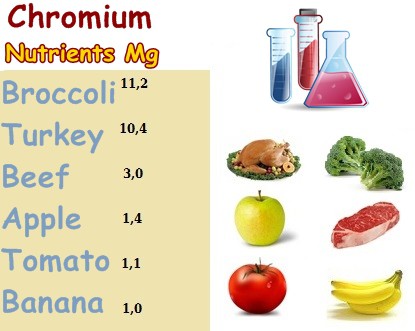What is the function of Chromium? As a dietary mineral, chromium regulates insulin production and activity which, in turn, helps cells make proper use of the glucose they receive. This helps regulate high blood sugar levels and prevent related medical conditions such as hyperglycemia and diabetes. In addition to this, chromium appears to control cholesterol levels in the blood, thus supporting cardiovascular health.

Chromium deficiency symptoms include: hyperinsulinemia (high levels of insulin in the blood), hyperglycemia (high blood sugar levels), hypertension (high blood pressure), high levels of triglycerides (a type of blood lipids or fat), high LDL (bad) cholesterol, insulin resistance, low HDL (good) cholesterol levels.
Note: Chromium is found in very small amounts in food sources. Research on the benefits of chromium and its role in promoting health is still somewhat scarce, and there is even disagreement on the status of chromium, with some health authorities refuting its quality of essential nutrient. Fortunately, it has been established with certainty that the human body requires small amounts of chromium on a daily basis: 35 micrograms for adult men and 25 micrograms for adult women. You can also include in your diet foods such as romaine lettuce, green beans, barley and black pepper which contain chromium, although in significantly smaller amounts. Also, studies show that vitamin C increases the absorption of chromium and helps you meet your daily requirements of the essential mineral.
